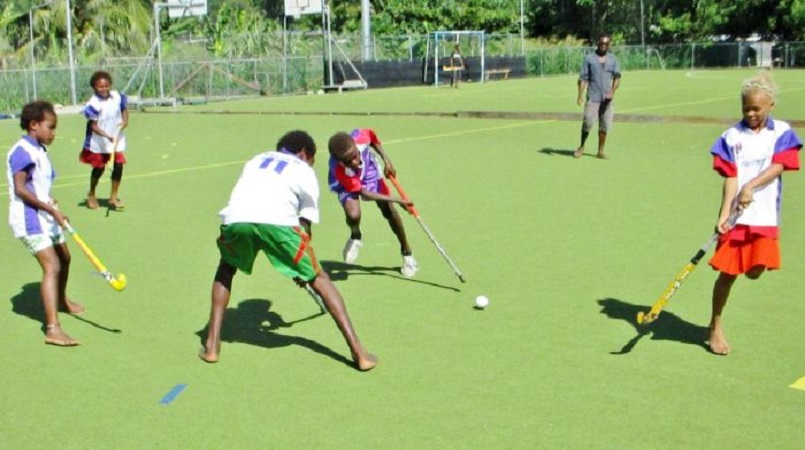
Hockey is catching on across the Pacific nation of Vanuatu, spreading messages of health on the way, but it is going to miss a knockabout Australian volunteer who is headed home.
The words just don't seem to match the person saying them.
"Yu mas go dring plante wota," he says, encouraging a young girl to stay hydrated.
"Yufala stap plei plei smol mor afta spel," he says to someone wondering how long before a break.
The language is Bislama, the creole language spoken across many of the islands that comprise Vanuatu. It is apparent the speaker knows his stuff, because the youngsters understand his every word.
But this Pacific language is coming from behind dark sunglasses and a bushy beard that looks like it should belong to notorious Australian bushranger Ned Kelly.
The speaker is, in fact, Australian. But he is from Alice Springs, not Glenrowan, and interested in the sort of shooting that wins hockey games.
Dash Hewitt is wrapping up a year-long stint as an Australian volunteer development officer with the Vanuatu Hockey Federation, using the time to impart important health messages to young Ni-Vanuatu.
He is clearly beloved, and his efforts to grasp the local language only make him more of a legend among them.
When Dash and his local crew pull into a village in the white ute that has come to be known as the 'hockey truck' children shouting "HOCKEY!" come from everywhere, ready for a game.
More than 200 Ni-Vanuatu children play the game each week thanks to the Pikinini Plei Plei program. But today, teams have assembled on the best surface in the nation at the Wan Smolbag multi-purpose centre in Port Vila for a tournament.
During a break, Dash sits in the shade and has a chinwag in Bislama, asking the players why they like hockey.
"Fun," offers one.
"Winning," says another.
"Stap friend blo yu," says a third, suggesting camaraderie is one of the great appeals.
"I think the kids just absolutely love any sport and organised sports for kids are not accessible to many at all," offers Dash, when asked the same question.
Hockey has been in Vanuatu for more than a decade, and an elite program is offering the best players international opportunities, but the idea of using hockey as a development tool is a more recent phenomenon.
"The hockey program also aims to provide a lot of education alongside its programs," Dash explains. "These range from nutrition and health to domestic violence to the environment."
As we chat, a primary school-aged boy trots up, hockey stick in hand. He tells a passionate tale in Bislama, complete with frowns, headshakes and general expressions of concern.
This is a mixed tournament but the young lobbyist is arguing the girls are too tired to keep playing and a male-only game should be instituted immediately. Dash is having none of it.
"The boys can be quite pushy," he says with a wink.
But this teacher of hockey, health and equality has also been a student of Pacific life.
"I love the family and community-oriented system and how happy, helpful and generous people are considering their circumstances are often so tough," he says.
"And I know my way around a coconut now, although [I] still haven't managed to climb up to get one. Squeezing out fresh milk for curries is awesome."
When he gets back to Alice Springs, Dash won't have as much use for his newfound tongue Bislama, but his curry should ensure there's a little bit of Vanuatu in the heart of Australia.
And all those village visits in the hockey truck mean this Aussie will long have a place in Ni-Vanuatu hearts too.
